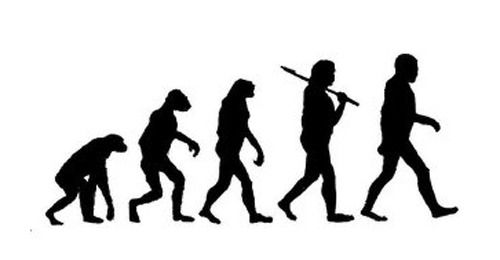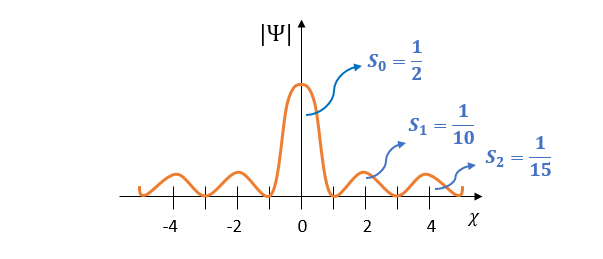[Scientific Essay] Quantum mechanics, Economics, and Theory of Evolution

Intro
Do you believe in evolution? We learn a theory of evolution through the school curriculum. But, we can easily see individual debates on the pros and cons of evolution. One day I had a chance to attend a lecture by professor Choi, who was a famous life scientist and author of the best-selling books in Korea. And the question about his view on evolution was not missed even in that place.
One does not believe in evolution for religious reasons; and another does not believe in evolution, regardless of religion, because it goes against common sense, details of theory keep change, and it cannot explain whole process clearly, etc.; the others explain science, pointing out the ignorance of unbelievers, and persuade them to believe in evolution.
Many people have participated in the debates on the evolution and have explained why evolution is right. The story that the court of the Pennsylvania dealt with the theory of evolution (Judgment Day: Intelligent Design on Trial) is famous. While I have watched a series of these debates, one thought flashed that the debates on evolution itself, not their contents, were somewhat unnatural. The article is about the unnaturalness that I felt.
It may seem a little off the wall, but I want to begin with understanding quantum mechanics.

Quantum mechanics
Quantum mechanics, along with the theory of relativity, is a revolutionary theory that led to modern physics. All of the cutting-edge IT gadgets that we enjoy today are attributed to quantum mechanics. But when quantum mechanics first appeared, it wasn't easy to accept. Even Einstein, who made the preposterous assertion that space and time were distorted, criticized quantum mechanics, saying " God does not play dice", and even Heisenberg, who introduced the uncertainty principle, denied quantum mechanics. What is quantum mechanics that would have caused the genius physicists of the time to object?
Quantum mechanics denies the existence of 'particles'. It overturns the very natural common sense that all things will be made up of any basic 'particles', just as the rock breaks into gravels and the gravel into sands. Quantum mechanics tells us that physical reality essentially exists as a 'probability wave' rather than a 'particle'. 'particle' is just a phenomenon that 'wave' shows under certain conditions. 'Probability wave' means that the position, momentum, and so on of what we believe to be 'particles' can only be described as the probability, and its distribution takes the form of 'wave'. For example, when an electron has the following 'probability wave' function, the reality of electron is in -1 <x <1 to 1/2, 1 <x <3 to 1/10, and 3 <x <5 to 1/15. but it does not mean electron splits in several pieces

And, in quantum mechanics, an act of observation collapses this probability wave, which specifies a certain amount of physical quantities (such as position), and makes the physical reality into 'particle' that corresponds to our common sense. What exists only in probability before observation becomes 'particle' through 'observation'. Quantum mechanics overturns our common sense again. To interpret the above sentences, we can say that the results are not driven by the causes, but the causes by the results of our observations.
The fact that physical reality exists in the form of probability, and that the cause is caused by the result, sounds like in wonderland that nobody can readily accept. Doesn't it make any sense why the physicists of the day have argued against quantum mechanics?
Now, going one step further, I am going to explain a little bit about Heisenberg's uncertainty principle, the most basic concept in quantum mechanics. The principle of uncertainty tells that if you accurately measure the position of a particle, you cannot know its momentum, and if you measure the momentum accurately, you will not know its position. It is easy to misunderstand that the uncertainty principle is caused by limitations of measurement technology, but the principle of uncertainty is the result of mathematical logic. As you all know, all wave functions can be described in a function space spanned by basis , and 'probability wave' can be expressed with basis
, and 'probability wave' can be expressed with basis  on the assumption of quantum mechanics. At this point, you can see that the momentum p and the position x are commuting observables. In other words, since the wave function on the x-domain can be Fourier transformed into the wave function on the p-domain, the probability distribution of p spreads more evenly as the probability distribution on x is concentrated on a certain x value. The figure below shows how a probability function distributed by Dirac Delta on the x-domain is transformed on the p-domain, assuming extreme conditions for better understanding.
on the assumption of quantum mechanics. At this point, you can see that the momentum p and the position x are commuting observables. In other words, since the wave function on the x-domain can be Fourier transformed into the wave function on the p-domain, the probability distribution of p spreads more evenly as the probability distribution on x is concentrated on a certain x value. The figure below shows how a probability function distributed by Dirac Delta on the x-domain is transformed on the p-domain, assuming extreme conditions for better understanding.

It's easy, isn't it?

Are you surprised to find terminology, graphs, and formulas that you do not understand? However, quantum mechanics is a very difficult discipline to understand properly without math. Ironically, quantum mechanics is such a discipline that "to do" quantum mechanics using mathematics is much easier than "to understand" quantum mechanics.
Quantum mechanics does not accord with our "Common sense". "Common sense" refers to comprehension, judgment, and reasoning along with general experience, but quantum mechanics explains what happens in a very small space that no one has ever experienced. It is natural that it can't be understood by common sense. Moreover, scientists still do not reach an agreement about its interpretation. At present, the Copenhagen interpretation is considered as the standard, and I have explained quantum mechanics according to it, but nobody is sure of it. Even Richard Feynman, a genius physicist of the 20th century, said, "I think I can safely say that nobody understands quantum mechanics."
therefore, if your reaction to the explanation of quantum mechanics is same below, you're the man of common sense

Now, at this moment that you have given up understanding quantum mechanics, I have one question to you. Do you believe in quantum mechanics?
Economics
Economics is a discipline that has contributed greatly to the prosperity that we enjoy today. Until now, economics has raised company well and has grown the size of the economy successfully. The names of great scholar such as Adam Smith, Marx, Hayek, Keynes, and others are very familiar to us. But most of us do not know much about 'economics'. Economics books are full of terminology, graphs, and formulas. Economics is not the subject to which we can approach intimately. We think economics is in the realm of specialist.
In this regard, the followings are excerpts from a lecture by Professor Chang Ha-joon, an economist and author of the best-selling book, "Bad Samaritans. "
RSA ANIMATE: Economics is for Everyone!
I try my best to dispel this widespread perception that the economics is too complicated for non-economist. And actually it's a very strange because people have very strong opinions about everything. Iraq war, gay marriage, does God exist, global warming, you already have very strong views on these things despite not having a degree in theology, not having a degree in energy economics, not having a degree in international relations. But when it comes to economics, people say "Oh yeah, it is for specialist, you know, I don't know." But why? I mean if you can have a very strong view on Iraq or Afghanistan without a degree in international relations, you should have a strong view on government economy policy without a degree in economics. I say that this is only because economics has been fantastically successful in making people believe that it is actually a lot more difficult than what it really is. So they'll tell you "you know, I could explain it to you but then you don't understand." 95% of economics is common sense. Of course, it may look too difficult with the use of jargon and mathematics. And even the remaining 5% can be understood at least in its essence if not in all technical details, if someone bothers to explain it to you in an accessible way. For example, what is economics, the ethical foundations of economics, whether you can separate economics and politics, and how different ways of conceptualizing the economy affects the way we see the world. [...] Now many economists tell you that economics is a science in which there's only one wide theory. There are at least nine different major schools of economics and in this several more if you count minor schools or split the major ones into sub schools. Each one with its unique strengths and weaknesses. [...] We need all these diverse approaches to economics in order to fully understand our economy, because they all make certain assumptions. They all have different underlying political and ethical values. They have all sorts of different theories about how the economy grows and so on.
Economics and politics cannot be separated, so even there's the phrase "Economics is politics". When Adam Smith or David Ricardo wrote economics, they didn't name "economics", but "political economics". At that time, politics and economics were considered inseparable. However, after the rise of the school of neoclassical economics in the 20th century, they changed its name to "economics", and claimed that economics is science so that political logic, moral and ethical standards should be excluded, having tried to separate economics from politics. Nowadays, many people say, "Political logic should not intervene in the economy." I think it's really wrong. Because it is the political act itself that defines the economy. In the nineteenth century, slave trade, child labor, and emissions of pollutants were allowed. At that time, slave trade and child labor were part of the economy. Now, who says you have to reintroduce child labor to make the labor market more flexible? This is because the boundary of the economy itself has completely changed. In the end, it was changed politically because people accepted that this was not possible. How can I tell you not to intervene in economic affairs when the boundaries of the economy are determined by politics? The essence of those who talk that way is "Don't touch my political logic because it's the economy. But don't intervene in economy because your political logic is politics as I see it." It is a very wrong idea. If you understand that the economics is politics, you understand that economic phenomena are not inevitable like earthquakes or tsunamis.
As Professor Chang said, economists have tried to make people perceived economics as a science, building a wall that prevent the public from debating economics. people have come to think you can't discuss economics unless you're an economics major.
However, the basic assumptions of economics are very political, moral and ethical. Economics is different from science. Economics should answer the question of how the community make a living right now, and which value should be more important. it is not like a science that can put off a decision till it is experimentally proved. Economics should analyze the present economy as much as possible and prepare for the future, which is surely involved with the interest of individuals and groups. That is reason why economics is not a science but an politics. Professor Chang said that discussions on economics are obligations for democratic citizens.

Theory of Evolution
The theory of evolution is a revolution in biology which was first suggested in Darwin's 'On the Origin of Species', just as quantum mechanics was a revolution in physics. Evolutionary theory says that in a given environment, one species becomes a different species through three steps: variation, heredity, and differential fitness. It also says that simple protein molecules have developed into the present human race. It was quite shocking when the evolutionary theory was published at first, but now it is biological orthodoxy and is more desirable to call it 'evolutionary biology' than to call it 'evolutionary theory'.
I think that the argument of evolution is strange in light of the two previous disciplines. Let's think about a fact that the question "Do you believe in quantum mechanics" which I gave you after the explanation of quantum mechanics is a very awkward expression, while the question "do you believe in evolution" is accepted. Scientific theory is not something that the public believes or not. Nobody insists that quantum mechanics is against common sense and suggests a hypothesis to replace it. Do you remember that 'economics' has become the subject the public cannot argue with, because people think of it as 'science'? Don't you feel strange about the debate on evolution?
I can say like the following, borrowing the expression of Professor Chang
Quantum mechanics, theory of relativity, electromagnetism, astronomy, you don't have any small opinion on these things, because of not having a degree in physics, not having a degree in electronics, not having a degree in astronomy. But when it comes to evolution, people say, "Oh yeah, it is interesting, you know, I have my theory" But why? I mean if you cannot have your own view on quantum mechanics or relativity theory without a degree in physics, you cannot have your own view on evolution without a degree in evolutionary biology.
Debating the pros and cons of evolution is just the result of the work of religious group, which have made what is actually "scientific thing" into "political thing", just as the work of economist have made what is actually "political thing" into "scientific thing". In recent years, there are those who use the term "intelligent design" to look like science instead of "creationism", and who pretend to be rational arbitrators by starting with "I accept the theory of evolution partially, but~." They say that they don't believe in evolution because it goes against common sense, details of theory keep change, and it cannot explain whole process clearly, regardless of religion. However, in essence, science is not something that can be discussed based on "common sense" without knowledge. Just as quantum mechanics is against common sense because the space that it handles is too small, evolution is also against common sense because the period that it handles is too long. Nobody survives that long time when evolution occurs. It is natural that it can't be understood by common sense. It is also true of all other scientific theories that the views are inconsistent, content-shifting, and incomplete among scientists. Supposedly, evolution is the only scientific theory that cannot be believed for such reasons. Therefore, all the arguments on evolution are built on the framework of religion. Even though the person is not a religious person, he falls into a trap made by religion and believes that evolution can be thought in his common sense.
If you want to criticize evolution and suggest an alternative theory, at least one of the two must be preceded. To obtain a Ph.D. in evolutionary biology and publish a paper, or to discover why evolution is not a scientific theory. If not, it is only a daydream at best. And the former looks much easier than the latter.
Outro
Though I said the evolutionary argument itself is a problem and pointed to religion as the cause, this is not for criticizing religion. I consider this phenomenon to be a natural relic left by the times. Humans have lived most of our past history without a distinction of philosophy, science, and religion. The philosopher was a scientist and a theologian. Now it is funny to think, but there was a time when Galilei claimed the heliocentric theory and was sent to a religious trial. There was time when Descartes conceived the law of inertia and tried to look for the cause in God's power. And there was a time when people believed the soul would be out while taking a photo. As the era has changed, science has separated itself from philosophy and religion and has built its own foundation. However, due to the short history of science, public awareness is still lacking in what science is. I believe, as the distinction between science and non-science becomes clear in the future, there will be less and less of an undesirable argument, such as the argument against evolution.
I think there's a lot to be said about the purity of the theories and science above though. Namely that despite the study of economics allowing us to understand changes in markets, we're yet to really see an economist who can safely predict market directions successfully and consistently over a long period of time. I think there's probably a lot to be said about survivor bias in those successful economists :)
Great post and thanks for the read, good to see people sticking up for science! If you're posting re: science in the future don't forget to use the tag #steemstem
thanks a lot. what is the tag #steemstem for? I am new to a steem system.
Hey, yeah no problems! It stands for steem science technology engineering and maths. A great \community where everyone posts about these cool things!
thank you.
Thank u.
감사합니다. 한글 페이지가 따로 있는데 영어페이지까지!
https://mb2-717-dumps.blogspot.com/2020/09/get-valid-huawei-h13-629v20-dumps.html
https://cs0-001-dumps.blogspot.com/2020/09/the-way-to-pass-exam-with-h35-211-exam.html
https://pass4sure-200-150-dcicn.blogspot.com/2020/09/knowledge-most-current-huawei-h31.html
https://www.olaladirectory.com.au/updated-nutanix-ncp-5-10-exam-preparation-material/
https://medium.com/@azytrend/ace-pdf-questions-perfect-idea-for-ace-test-preparation-2aea76b336e9
https://www.olaladirectory.com.au/brilliant-ncse-core-exam-questions-with-pdf-dumps/
https://www.lily.fi/blogit/exambraindumps/latest-ibm-c1000-056-braindumps-for-huge-success/
http://certificationexam.educatorpages.com/